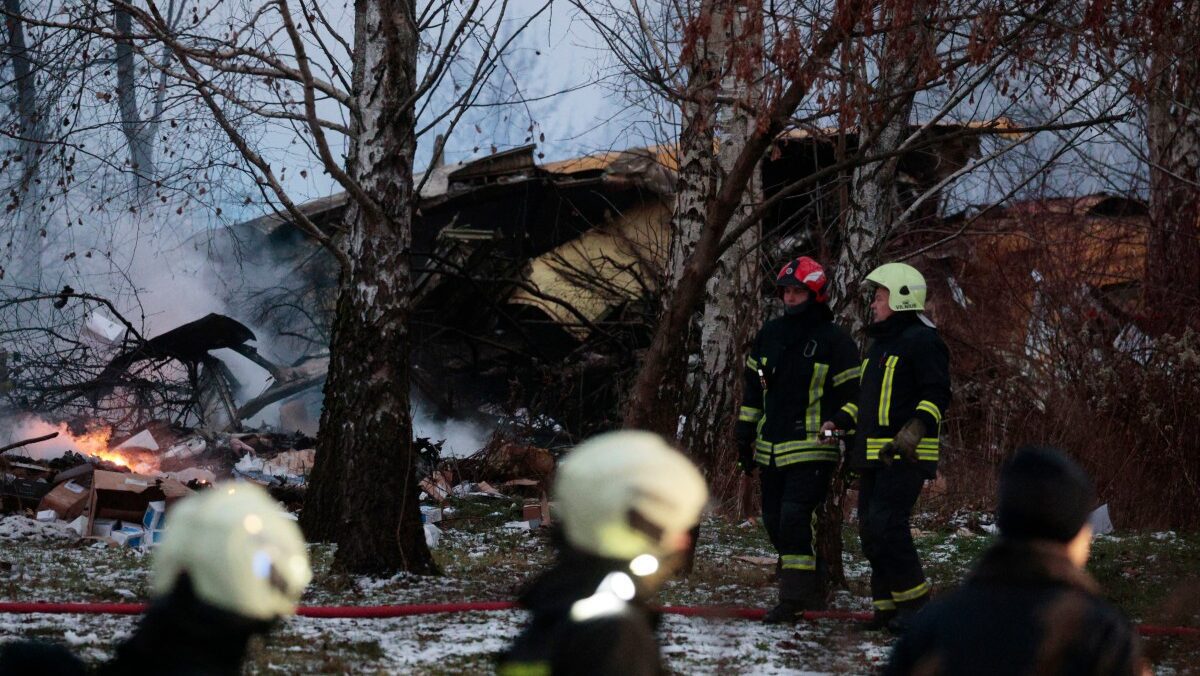
Lithuanian rescuers work next to the wreckage of a cargo plane following its crash near the Vilnius International Airport in Vilnius on November 25, 2024.
Photo: Petras Malukas / AFP
A cargo plane belonging to the German logistics company DHL crashed near the Vilnius airport on Monday morning, November 25th, killing one and injuring three others on the aircraft. The cause of the crash remains unknown, and although there is no indication that the crash might have been caused by an act of sabotage, the Lithuanian authorities won’t reject the possibility of terrorism behind it due to similar cases earlier this year.
After taking off from Leipzig, Germany, the plane crashed just as it was preparing to land in Vilnius at around 3:30 a.m., less than two kilometers away from the runway. Security cameras picked up the aircraft exploding in a ball of flames as it touched the ground.
According to rescue services, the plane hit the ground and split into pieces while sliding another hundred meters. Some debris hit a nearby house, from where twelve people were evacuated but no casualties were reported.
“In the recording of the conversation between the pilots and the tower, the pilots, until the very last second did not tell the tower of any extraordinary event,” said Marius Baranauskas, head of the Lithuanian National Aviation Authority.
“We need to examine the black boxes to know what was happening in the aircraft,” he said.
The Lithuanian police confirmed that a Spanish citizen died in the crash aboard the aircraft, while three others—a second Spanish citizen along with a German and a Lithuanian—were injured.
Lithuanian counter-intelligence chief Darius Jauniskis told reporters that investigators will keep every option on the table.
“We cannot reject the possibility of terrorism,” Jauniskis said. “But at the moment we can’t make attributions or point fingers, because we don’t have such information,”
The suspicion is based on the fact that DHL was the company that recorded two separate spontaneous ignitions in its warehouses (one in Germany, the other in Britain) earlier this year, which authorities believe to have been parcel bombs belonging to a Russia-linked group of saboteurs.
As we also reported, Western security officials suspect that the summer explosions were part of a covert Russian operation intended as a “test run to figure out how to get such incendiary devices aboard planes bound for North America.”
Last month, Poland arrested four individuals over “parcels containing camouflaged explosives” and issued international arrest warrants for two more suspects related to the case.
Polish prosecutors have not yet disclosed the names or nationalities of the suspects but agreed with the hypothesis that the initial bombs found were part of a “rehearsal” for a larger operation and admitted the risk of similar explosions happening in the future not only on land but also during “air transport.”
While this might explain Monday’s crash, Lithuanian authorities stressed the importance of not jumping to conclusions before the police investigation and the parallel civil aviation probe are finished.
“Only these investigations will answer questions on the real reasons of the incident, speculations and guesses will really not help to determine the truth,” Prime Minister Ingrida Simonyte said in a statement.
The DHL is also launching its own internal investigation into the incident, a company spokesman confirmed. “The aircraft contained regular parcels. We do not have any information that any of them were suspicious,” she told Reuters.
Boeing is gathering additional data on the aircraft to provide support to authorities while Swiftair, the airline operating the flight, declined to comment.
German security authorities confirmed that they are also investigating the crash and are in close contact with other foreign agencies. German and British investigators have been already working together, as well with other European law enforcement agencies, to map out the suspected saboteur network behind the warehouse fires in July.
